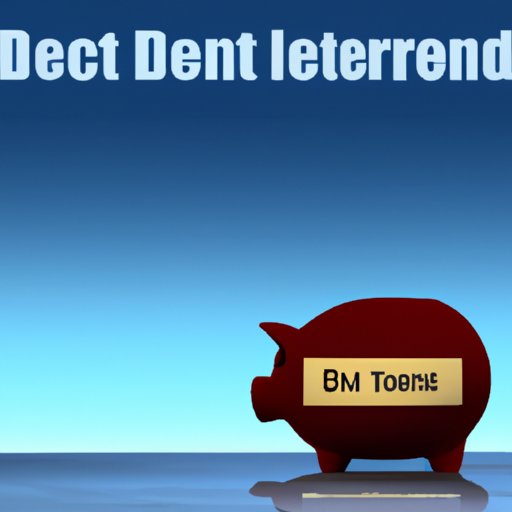Introduction
Debt can be both a blessing and a curse. On one hand, it can provide us with the capital we need to make important purchases or investments. On the other hand, it can be a burden if not managed properly. When it comes to deciding whether to pay off debt or invest, it can be difficult to know which option is best. This article will explore the pros and cons of paying off debt before investing, as well as the different types of debt, investment returns, strategies for balancing debt repayment and investment goals, alternatives to paying off debt, and the impact of time horizon on decision making.

Analyze the Pros and Cons of Paying Off Debt Before Investing
Paying off debt before investing has its advantages and disadvantages. On the plus side, it can reduce the amount of interest you’re paying on debt, freeing up more money for other expenses or investments. Additionally, it can improve your credit score, making it easier to get loans or other forms of financing in the future. On the downside, paying off debt before investing means that you may miss out on potential returns from investments that could be higher than the interest rate on your debt.
Consider the Different Types of Debt and Their Implications for Investing
When considering whether to pay off debt or invest, it’s important to consider the different types of debt. Credit card debt typically has high interest rates and should be paid off as soon as possible. Student loan debt usually has lower interest rates and can be paid off over time while investing in other areas. Mortgage debt typically has the lowest interest rates and can be paid off gradually while still investing in other areas. Other types of debt, such as car loans or personal loans, will vary depending on the interest rate and should be evaluated on a case-by-case basis.
Examine How Investment Returns Compare to Interest Rates on Debt
Another factor to consider when deciding whether to pay off debt or invest is the potential return on investments versus the interest rate on the debt. Generally speaking, investments with higher risk tend to have higher returns. For example, stocks tend to have higher returns than bonds, but they also come with greater risk. It’s important to do research and understand the risks associated with various investments before investing any money. Additionally, it’s important to compare the interest rate on the debt to the potential returns of the investments.

Review Strategies for Balancing Debt Repayment with Investment Goals
When deciding whether to pay off debt or invest, it’s important to find a balance between the two. One strategy is to prioritize debt repayment over investing. This approach involves paying off as much debt as possible before investing any money. Another strategy is to invest in low-risk options while repaying debt. This approach allows for some investing while still making progress on debt repayment. The final strategy is to invest in higher-risk options while repaying debt. This approach carries more risk but also has the potential for greater returns.
Explore Alternatives to Paying off Debt Before Investing
In addition to paying off debt before investing, there are several other options available. Refinancing debt can help reduce the interest rate on the debt, making it easier to pay off. Consolidating debt can help simplify the repayment process by combining multiple debts into one payment. Transferring debt to a lower-interest credit card can also help reduce the interest rate and make repayment easier.

Evaluate the Impact of Tax Benefits on Paying Off Debt or Investing
It’s also important to consider the potential tax benefits of paying off debt or investing. Paying off debt can result in a reduction in taxable income, potentially reducing the amount of taxes owed. Investing, on the other hand, can result in deductions for certain types of investments, such as retirement accounts, which can result in a lower tax bill.

Analyze the Effect of Time Horizon on Deciding Whether to Pay Off Debt or Invest
The time horizon of the decision to pay off debt or invest is another important factor to consider. For those with a short-term time horizon, it may make sense to prioritize debt repayment over investing. For those with a long-term time horizon, it may make sense to invest while paying off debt over time. It’s important to evaluate the individual situation and determine the best course of action.
Conclusion
Deciding whether to pay off debt or invest can be a difficult decision. It’s important to consider the different types of debt, the potential returns on investments compared to the interest rate on the debt, strategies for balancing debt repayment and investment goals, alternatives to paying off debt, and the impact of time horizon on decision making. Ultimately, the best course of action will depend on the individual situation and goals.
(Note: Is this article not meeting your expectations? Do you have knowledge or insights to share? Unlock new opportunities and expand your reach by joining our authors team. Click Registration to join us and share your expertise with our readers.)
